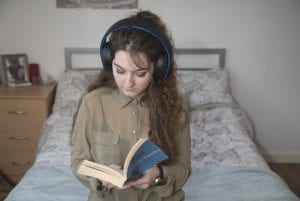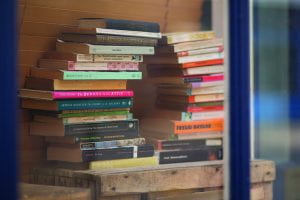Padraig Kirwan, Senior Lecturer in the Literature of the Americas, gives his insight one of the English and Comparative Literature (ECL) department’s courses: English and American Literature.
Hi there! Could you tell us a little bit about yourself and your background?
I’m one of the five American literature specialists here in ECL. My research is primarily in the area of indigenous literature, and I joined the department in 2006. I did my PhD at University College Dublin, Ireland, and taught there. I also taught at the University of Dublin, Trinity College before coming to Goldsmiths.
Please can you give us a quick overview of the degree course?

Our students take four modules per year. One of those modules is entirely devoted to American literature in Year 1, where we cover key moments in U.S. history and culture by reading a broad range of texts and engaging with various moments in American history. The Year 1 syllabus consequently includes everything from Puritan sermons to twenty-first century Native American literature. In all three years of the degree students can also take modules which are open to everyone studying in ECL; students can choose from over thirty option modules in Years 2 and 3, but are required to take at least two American Literature modules in both years. In terms of U.S. writing, we teach everything from nineteenth-century American literature and Hollywood cinema to African American writing and climate change fiction. Students can also choose to study modules such as Shakespearean drama, Old and Middle English, British Romanticism and European cinema. As a result, English and American Literature students really get the best of both worlds, and can engage with literary theory, Victorian literature, and the wider literary canon. Assessment consists of a mixture of portfolio essays and a small number of examinations; we are very keen that our students develop their writing skills and offer feedback on early draft work in many instances.
What makes the Goldsmiths course distinctive?
The BA in English and American Literature is a really distinctive and unique degree, and is the only one of its kind at any of the University of London institutions. The amount of attention that we pay to specific texts, and the manner in which we link the writing to cultural contexts, is quite exceptional when compared to degrees offered on the other University of London campuses. Our students form a really tight-knit community over the three years, and we run events such as “America on Screen” – a bi-monthly gathering where lecturers briefly introduce a great American movie, and we all meet to watch it and chat.

What are you looking for in an applicant? Do you have any tips for a great personal statement?
I was the admissions tutor for this degree for two years, and then served as the Head of Admissions for ECL for four years. I read thousands of applications during that time! The ones that stick in mind gave me a highly personalised sense of the person’s enthusiasm for literature, explained why, exactly, they were excited at the prospect of reading for an English degree. I got a real sense of the energy and the rigour that those applicants would bring to their study, and could see exactly what it was that drove them to engage with literary texts and broader contexts. Write about yourself and your passion is my advice.
How does this degree support students practically for life after university?
Any degree in English is enormously practical. The students who I have taught have gone on to forge extremely rewarding and successful careers in a vast range of areas and companies: major publishing firms including Penguin, The Economist and Condé Nast; advertising and communications companies such as Freud Communications and AMV BBDO; and the creative industries such as ITV and the Tate Modern. Many students have become teachers, be it at university or secondary school level. Others have gone on to become lawyers. A few are writers, unsurprisingly enough. Anywhere that text and imagination is used, you’ll find our students!
And finally…tell us a joke!
Brexit?
To find out more about any of our courses in the Department of English and Comparative Literature, visit gold.ac.uk/ecl